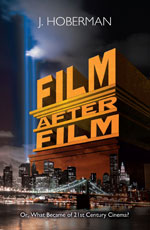
| NYWI HOME PAGE | VISITING WRITERS & EVENTS INDEX | VIDEO ARCHIVES |
 |
INFLUENTIAL AMERICAN FILM CRITIC,
TO DISCUSS NEW BOOK ABOUT THE FUTURE OF CINEMA
NYS Writers Institute, December 7, 2012
8:00 p.m. Reading/Discussion | Recital Hall, Performing Arts Center,
Uptown Campus
CALENDAR LISTING:
J. Hoberman, one of the most influential American film critics of recent decades, will discuss his new book on the future of cinema, Film After Film (2012) at 8:00 p.m. on Friday, December 7, 2012 in the Recital Hall, Performing Arts Center, on the University at Albany’s uptown campus. A portion of the Writers Institute’s fall 2012 Classic Film Series screened throughout the past three months was based on Hoberman’s list of his favorite 21st century films. The event is free and open to the public.
PROFILE
J. Hoberman, one of the most influential American film critics of recent decades, is admired for his wit, intellectual energy and incomparable knowledge of experimental, international, independent, and Hollywood cinema. In a 2012 article, Time magazine arts editor Jessica Winter praised Hoberman’s work as “elegant, erudite, ambitious, and wondrously droll arts and media criticism,” and credited him for teaching her generation of critics “how to think and write about popular culture.”
 Hoberman’s new book is Film After Film (Or, What Became of 21st Century Cinema?) (2012), which argues among other things that the future of film is computer-generated animation (CGI), ending “the need for an actual world, let alone a camera.” Hoberman examines the work of filmmakers who embrace this development; others who find inspiration in the complicated and slippery relationship between film and reality; and others still who reject virtual reality in favor of what he calls, “The New Realness,” a powerfully (even painfully) realistic style of filmmaking. Hoberman also visits a variety of other preoccupations of 21st century filmmakers, including globalization, accelerated cultural change, terrorism, and the end of the world.
Hoberman’s new book is Film After Film (Or, What Became of 21st Century Cinema?) (2012), which argues among other things that the future of film is computer-generated animation (CGI), ending “the need for an actual world, let alone a camera.” Hoberman examines the work of filmmakers who embrace this development; others who find inspiration in the complicated and slippery relationship between film and reality; and others still who reject virtual reality in favor of what he calls, “The New Realness,” a powerfully (even painfully) realistic style of filmmaking. Hoberman also visits a variety of other preoccupations of 21st century filmmakers, including globalization, accelerated cultural change, terrorism, and the end of the world.
Writing for the Wall Street Journal, Steve Dollar called Film After Film, “Spirited, thought-provoking and popping with fresh perspectives.” Phillip Maciak of the Los Angeles Review of Books called it, “A brilliant, patchwork statement about the future of the cinema— spoiler alert: there is a future— in the face of reports of its imminent demise...,” adding that, “Hoberman’s book is a broadly accessible errand in the articulation of how we might imagine digital cinema to reflect 21st century culture.”
Senior film critic at the Village Voice from 1988 to 2012, Hoberman started with the paper in the 1970s as a third stringer under critic Andrew Sarris. Born and raised in New York City, he received his B.A. from Binghamton University (SUNY).
Hoberman’s earlier books include Home Made Movies: Twenty Years of American 8mm & Super-8 Films (1981), Vulgar Modernism (1991), Bridge of Light: Yiddish Film Between Two Worlds (1992), The Red Atlantis: Communist Culture in the Absence of Communism (1999), The Dream Life: Movies, Media, and the Mythology of the Sixties (2003), The Magic Hour: Film at Fin de Siècle (2003), and An Army of Phantoms: American Movies and the Making of the Cold War (2011).
The Writers Institute’s “Future of Film” series, part of our Fall 2012 Classic film series, was based on Hoberman’s list of quintessential 21st century films. These included Mamoru Oshii’s Avalon (2001), Tsai Ming-liang’s Goodbye, Dragon Inn (2002), Nuri Bilge Ceylan’s Once Upon a Time in Anatolia (2011), and Julia Loktev’s Day Night Day Night (2002). As a prologue to our “Future of Film” series, Hoberman recommended that we screen Paul Fejos’ Lonesome (1928), a silent film that, in its own day, wrestled with issues that confront film in the 21st century: new technologies, new definitions of art and entertainment, and a rapidly changing society.